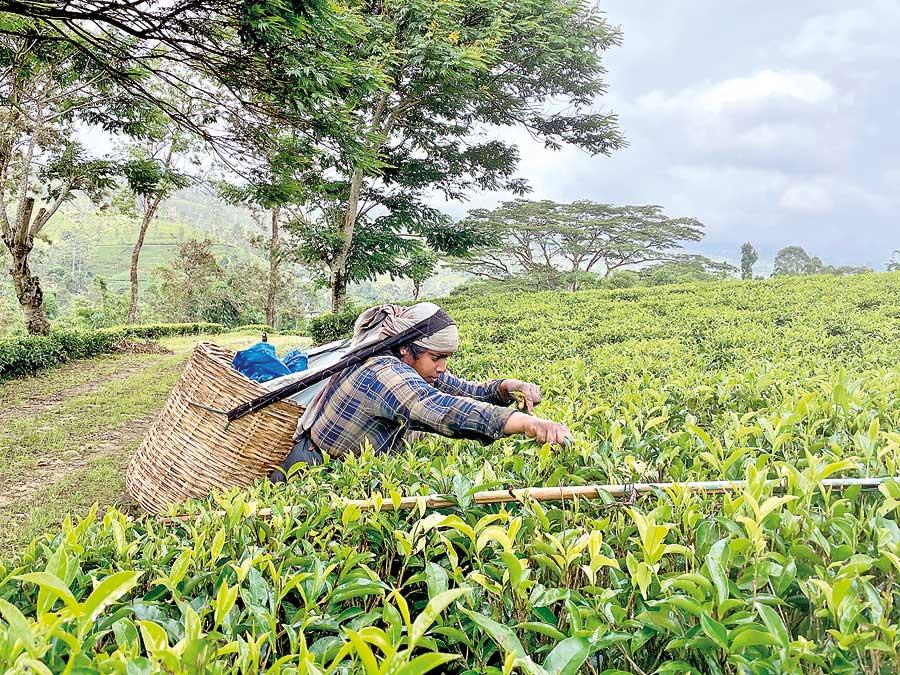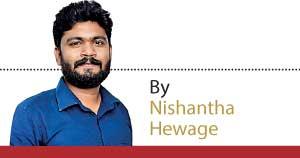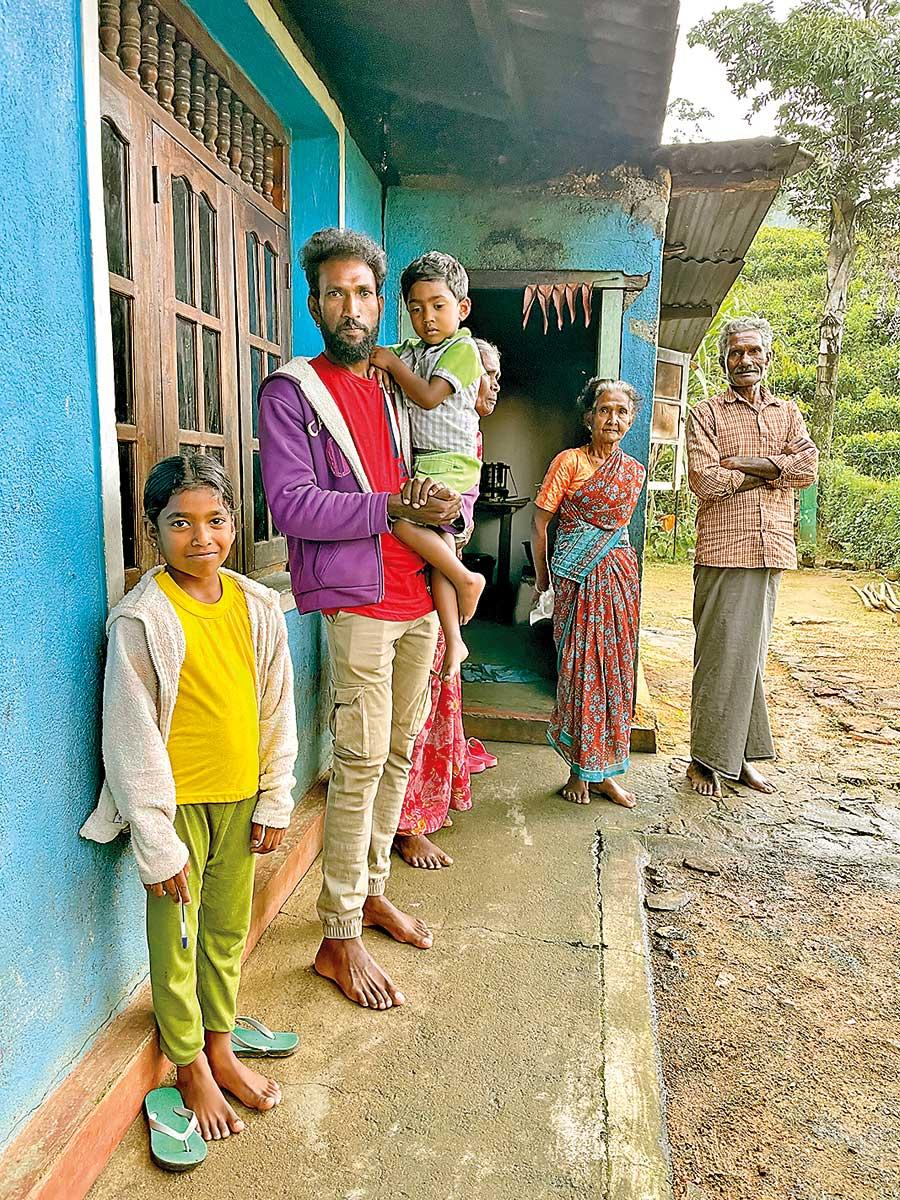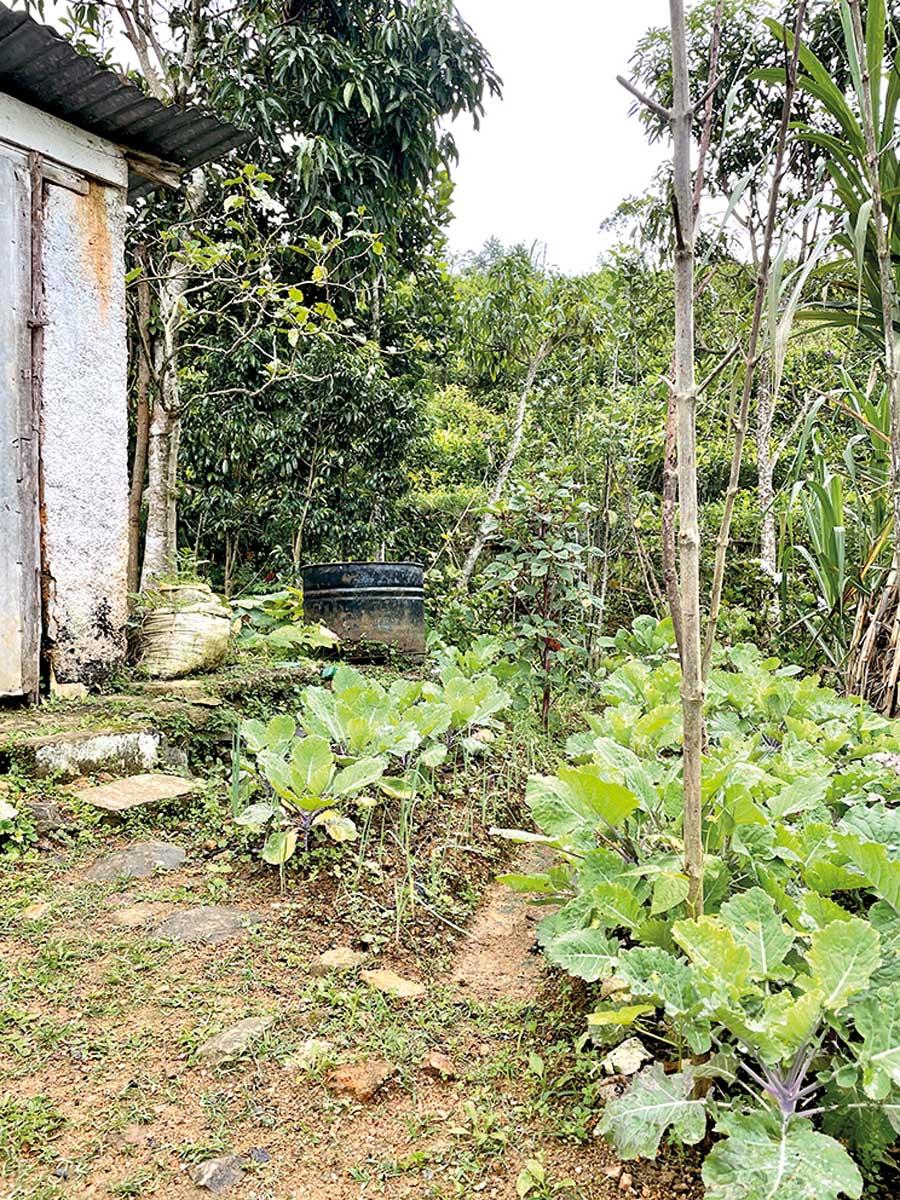23 Sep 2022 - {{hitsCtrl.values.hits}}
 Subramaniam Devi plucking tea leaves at an estate in Maskeliya
Subramaniam Devi plucking tea leaves at an estate in Maskeliya
Pics by Natalie Mayroth
With Sri Lanka facing the worst socio-economic crisis since independence in 1948, many sections of the society feel the impact of the crisis adversely. In light of these events, the DailyMirror team travelled to Nuwaraeliya district’s village Maskeliya, to report on grievances of the estate community and their hopes to overcome the difficulties they face.
society feel the impact of the crisis adversely. In light of these events, the DailyMirror team travelled to Nuwaraeliya district’s village Maskeliya, to report on grievances of the estate community and their hopes to overcome the difficulties they face.
Gloomy days
The vegetables in the garden were turning pale and this time for Sivanu Sivalingam, 72, incessant rains are not a good sign. The months ahead will be difficult for him to survive with his wife, son and two grandchildren. Mr. Sivaligam’s son Chandran, 38, has just returned from work. His work in the tea factory does not offer him a sufficient salary to support the family. Chandran’s wife Waidyajodi has gone to the Middle East to work as a housemaid. Their only hope is the Rs. 30,000 she sends every month for the family’s expenses. However, Chandran is worried if he would be able to manage the expenses amidst the rising prices of goods. For people like Sivalingam and his son Chandran, little hope is left when the country is facing an economic crisis and the cost of living has risen to unprecedented levels. However, the home garden has produced some hope, but Sivalingam worries over continuous rains that could possibly destroy his harvest.
Speaking to the DailyMirror, Sivalingam said, “For more than five years I have been cultivating a home garden to supply enough vegetables for daily meals. This would cut off some of the expenses that could have incurred if I hadn’t cultivated. I am happy in a way but this time rains seem to be continuing.”
For Chandran, taking care of the children and going to collect firewood has become the daily task. His 11-year-old daughter and 3-year-old son spend the day mostly with the grandparents. Sivalingam’s wife Poovai brings the family together when she makes tea for everyone to gather and drink. This gives the family a moment of pleasure and solace.
“My wife went to the Middle East early this year to support the family,” Chandran said, holding his son in his arms. “I could have gone overseas if I had money. It costs at least Rs. 400,000 for men to go to the Middle East for work,” he said.
He said there were free offers for women if they took a job as housemaids. “I work in a tea processing unit at a village tea factory. But that would not be enough to support a family of six people since my parents are old,” he said.
He starts his day early. These days he needs to walk to the processing unit. “In the afternoon about 2pm I finish my work in the factory. Then I help my father in our garden,” Chandran said.

Sivalingam with his wife Poovai, son Chandran and grandchildren
Denied privileges
For 37-year-old Subramaniam Devi, life has become so difficult after the crisis hit the country’s vulnerable people like her. Being a tea plucker, she could earn less than Rs. 10,000 last month. Even before the crisis, her life looked bleak and now it has become worse as she has to take care of three children.
The mother of three does not own the land on which she lives. She, like many other Tamils who work in the important tea industry in the Nuwara Eliya region, has limited opportunities. Some of them have no address and fear that if they leave their homes, some of which have been passed down through generations, the plantation owners will confiscate them. That is not Mrs. Devi’s biggest concern now. The tea leaves have become less. That is her worry now. This means that she earns less as she is paid for the number of kilos she plucks a day.
Tea is one of the major export crops in Sri Lanka and brings a large amount of foreign exchange to the country. According to the Sri Lanka Export Development Board, tea exports account for about 11% of the total exports, and about 62% contribute to the total agriculture exports in the country. However, the arduous work of tea pluckers and others who directly contribute to the production is not fairly compensated. They undergo many discriminatory practices that have worked to their disadvantage, depriving them of housing facilities, safe drinking water, and access to proper education and healthcare.
“I get only Rs.500 a day now. We get Rs. 1000 a day only if we could pluck 19 kg or more. We cannot reach that target, as there are not enough tea leaves to pluck every day due to the lack of fertilizer. Besides, for every kilo we pluck less than 19 kg we get only Rs. 50. We hardly pluck 19kg of tea leaves a day,” Mrs. Devi said.
She said there was no point that Government had increased the daily wage to Rs. 1000 because they received Rs. 1000 only if they reached the target of 19kg of tea leaves a day. “This is a tough target as there is not enough tea harvest. Tea estates were impacted by the fertilizer ban last year,” she said.
Devi said, “Before we start plucking tea leaves we uproot weeds around tea bushes. How can I feed my three children at home when there is less work and the income is low? My husband works at a grocery shop and earns about Rs.30,000 a month. That is not enough for the entire family. There are days where we don’t have proper meals. My only worry is how my husband and I could feed our children with the little income we have. There aren’t enough powdered milk packets at grocery stores. Even in bigger shops we can’t afford to buy a packet of powdered milk.”
Speaking to the Daily mirror Devi’s husband Veeran Viswanathan said, “My income is not enough for the entire family. My aging parents also live with me. I have to look after them as well. Besides, I have to look into the needs of my three children and wife. It is too difficult to manage the expenses when prices of essential goods are rising. The Government should control prices. Otherwise, poor people like us have to bear the burden. Earlier at least we could afford three decent meals. Now we cannot think of three proper meals. I worry about my one-and-half-year-old daughter, as we are unable to provide her nutritious food and powdered milk. The price of powdered milk has increased by threefold compared to last year. It was around Rs. 400 a packet of 400g powdered-milk but now it costs more than Rs. 1,000.
Hope amidst adversity
For 39-year-old Nagamuttu Sudhaharan, his home garden, which he started four years ago with the help of a European Union-Sri Lanka project, has become a blessing because he now entirely uses vegetable varieties for daily meals. His hope lies in this small home garden as he has less work in the construction field. For Sudhaharan this has become a nightmare, which could possibly leave the entire family hungry. Despite the bleak times, he knew his home garden would be his only relief. “I spend some money to buy rice from the money my wife earns as a tea plucker. From that money, we manage to buy a few kilos of rice. I have cultivated more than 25 varieties of vegetables in my home garden. I use only bio-fertilizer for cultivation. I make the fertilizer on my own. It doesn’t cost anything. Even the dried leaves from the vegetable plants can be used,” he said.
Sudhaharan said at least he could feed his three children now, adding that this time there was too much rain and the harvest was less. “I spend much time here in the garden when I have no work. I also want to make a net for other vegetable crops that are not grown here. We benefit from the European-Sri Lanka project. They provide us with the necessary expertise, training, tools and seeds. In the future, I want to plant more varieties of vegetable crops.”
Contributed by Natalie Mayroth

The vegetables in the garden were turning pale and this time for Sivanu Sivalingam, 72, incessant rains are not a good sign.
25 Dec 2024 9 hours ago
25 Dec 2024 25 Dec 2024
25 Dec 2024 25 Dec 2024